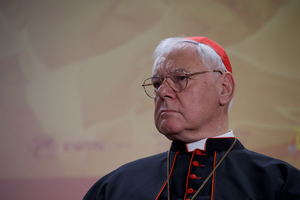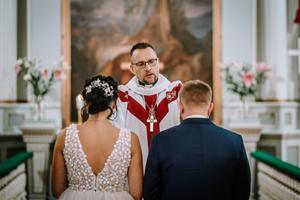Hungarian Foreign Minister: We Want a Christian Hungary, a Christian Europe
In an interview with the Register, Péter Szijjártó explains why he believes his government’s EU-opposed immigration policy is necessary to preserve Hungary’s and Europe’s Christian heritage.

In recent years, Hungary has been almost alone in Europe in fighting to retain its Christian heritage and to preserve its Christian identity in the face of a European Union that has tried to do the opposite.
And it has done so largely through what some see as a “hardline” immigration policy, but which the country’s government insists is a sensible policy of controlled immigration (it opposes illegal and irregular immigration and favors tight control of its outer borders).
This week, that policy (along with others) led to a clash with the European Parliament, which is looking at taking unprecedented disciplinary action against the country for allegedly breaching the EU’s core values. If approved, punitive measures could include suspension of Hungary’s voting rights, although this is considered unlikely.
Hungary’s foreign minister, Péter Szijjártó, has called the move “petty revenge” of politicians who favor an open-borders policy across Europe.
Bishops of the region appear to be backing Hungary’s position on migration: The Episcopal Conferences of Central and Eastern Europe issued a statement Sept. 7 in which they said the migration crisis shows “it is not easy to overcome the mental and cultural differences that exist between East and West.” They added that, although nations must not be “indifferent” to those “in life-endangering situations or suffer from hunger and famine,” everything must be done “to help their countries of origin to solve the problems that cause migration.”
On Aug. 24, Szijjártó spoke to the Register about its policy with respect to preserving the nation’s Christian heritage and identity and explained why Hungary is the only country in the world to have a department dedicated to helping persecuted Christians. Hungary’s bishops are supporting the government’s commitment and on Sept. 5 made an appeal to help Christians suffering from persecution in Africa and Asia.
Hungary has done much to help persecuted Christians: What are the government’s plans for the future in this regard?
Hungary feels responsible, as representative of a Christian country, to help those Christian communities which are in need. That’s why we have created a separate state secretariat which has a dedicated desk to monitor the situation of persecuted Christian communities. We have always given financial resources directly to these communities and will continue to do so. Just recently, we decided in favor of granting a million euros to the Maronite Church in Lebanon so it was able to carry out family supporting actions, and we financed the renovation of more than 40 Christian churches in Lebanon, as well. In the future, we’ll do more to help those Christian families be able return to their homes, [those] who had to escape because of ISIS or other terrorist organizations that took over their homes and territories.
Why is protecting persecuted Christians so important to the Hungarian government?
Hungary has been a Christian country for more than a millennium. The current government is a Christian democratic government which takes seriously the heritage of Christianity in Hungary and in Europe, and we’d like to preserve Europe as a Christian Europe. We want to preserve Hungary as Hungarian and as a Christian Hungary. As a government which takes seriously its local responsibility, we cannot leave global responsibility out of sight; and so, if we, as a Christian country for a millennium, do not help persecuted Christian communities all over the world, then who will?
How important is it that Europe retains its Christian heritage and identity, and how is this central to Hungary’s immigration policy?
We are sure that this migratory crisis endangers the Christian heritage of Europe. Unfortunately, proof of this has been seen and experienced in the Western part of Europe as legislation was passed to remove Christian symbolism from certain public buildings. We don’t like this phenomenon. We think Europe should stick to its Christian values. This is the only way Europe can regain its strong position with regard to global competitiveness, be it economic, trade or demographic.
Do you see defense of the Christian faith as synonymous with defense of sovereignty, especially in the face of an EU that is criticized for showing less and less respect for state autonomy and democracy?
Yes, actually the European Union is a hostage to hypocrisy and political correctness, and this keeps Europe away from being brave enough to speak up for its Christian heritage. We think that freedom is one of the most important values of Europe, and freedom of religion must be at the top of this category. Freedom of religion is a God-given right, and so no man can take it away from anyone. So without having religious freedom, we definitely can’t speak about freedom at large in Europe, and nowhere else in the world.
- Keywords:
- edward pentin
- european union
- hungary


















